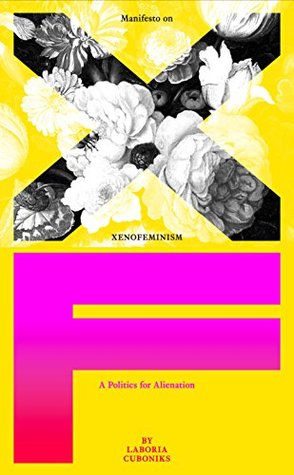Book Notes: The Xenofeminist Manifesto
The Xenofeminist Manifesto: A Politics for Alienation
by Laboria Cuboniks
Read
Aug 28, 2020 -
Aug 28, 2020
⭐⭐⭐⭐
This manifesto by the Laboria Cuboniks feminist collective can be read for free on their website, and it is also available in book form.
Xenofeminism (XF for short) is a contemporary feminism, intersectional, explicitly queer and trans-inclusive. It talks about the need for a feminist technology and science, as well as an ambitious global movement for change.
XF has clear influences from the Cyborg Manifesto (my notes on that are here), and the language is similarly academic and an effortful read. As many other manifestos, it states an ideology but provides no actionable steps to take, things to do in order to bring about the new order that XF dreams of.
Book highlights
XF is not a bid for revolution, but a wager on the long game of history, demanding imagination, dexterity and persistence.
Freedom is not a given–and it’s certainly not given by anything ‘natural’. The construction of freedom involves not less but more alienation; alienation is the labour of freedom’s construction. Nothing should be accepted as fixed, permanent, or ‘given’–neither material conditions nor social forms.
The real emancipatory potential of technology remains unrealized.
It is true that the canonical ‘history of thought’ is dominated by men, and it is male hands we see throttling existing institutions of science and technology. But this is precisely why feminism must be a rationalism–because of this miserable imbalance, and not despite it. There is no ‘feminine’ rationality, nor is there a ‘masculine’ one.
We want to cultivate the exercise of positive freedom–freedom-to rather than simply freedom-from–and urge feminists to equip themselves with the skills to redeploy existing technologies and invent novel cognitive and material tools in the service of common ends.
We want neither clean hands nor beautiful souls, neither virtue nor terror. We want superior forms of corruption.
Let a hundred sexes bloom! ‘Gender abolitionism’ is shorthand for the ambition to construct a society where traits currently assembled under the rubric of gender, no longer furnish a grid for the asymmetric operation of power.
The universal must be grasped as generic, which is to say, intersectional. Intersectionality is not the morcellation of collectives into a static fuzz of cross-referenced identities, but a political orientation that slices through every particular, refusing the crass pigeonholing of bodies.
This non-absolute, generic universality must guard against the facile tendency of conflation with bloated, unmarked particulars–namely Eurocentric universalism–whereby the male is mistaken for the sexless, the white for raceless, the cis for the real, and so on.
Our lot is cast with technoscience, where nothing is so sacred that it cannot be reengineered and transformed so as to widen our aperture of freedom, extending to gender and the human.
Digital technologies are not separable from the material realities that underwrite them; they are connected so that each can be used to alter the other towards different ends.
The task before us is twofold, and our vision necessarily stereoscopic: we must engineer an economy that liberates reproductive labour and family life, while building models of familiality free from the deadening grind of wage labour.
Like engineers who must conceive of a total structure as well as the molecular parts from which it is constructed, XF emphasises the importance of the mesopolitical sphere against the limited effectiveness of local gestures, creation of autonomous zones, and sheer horizontalism, just as it stands against transcendent, or top-down impositions of values and norms.
How do we build a better semiotic parasite–one that arouses the desires we want to desire, that orchestrates not an autophagic orgy of indignity or rage, but an emancipatory and egalitarian community buttressed by new forms of unselfish solidarity and collective self-mastery?
Xenofeminism is a platform, an incipient ambition to construct a new language for sexual politics–a language that seizes its own methods as materials to be reworked, and incrementally bootstraps itself into existence.
If nature is unjust, change nature!
